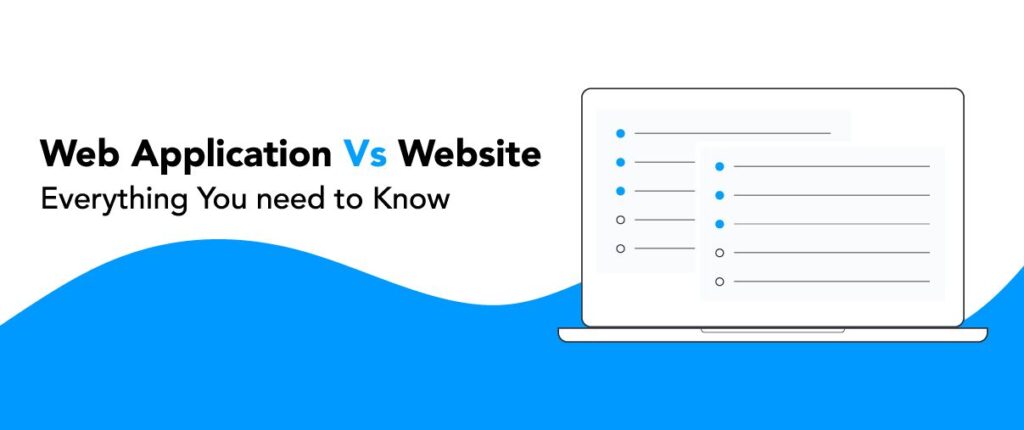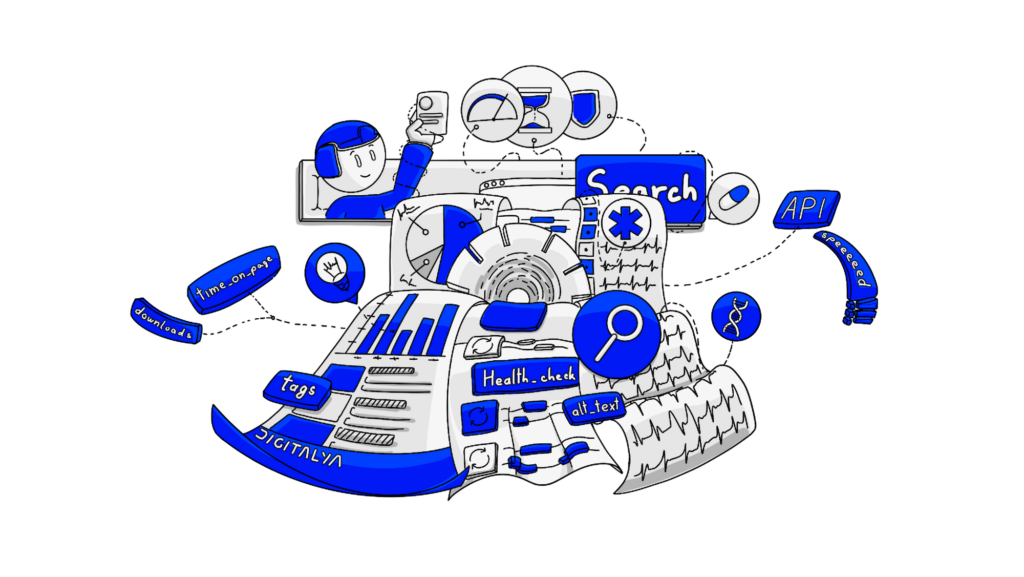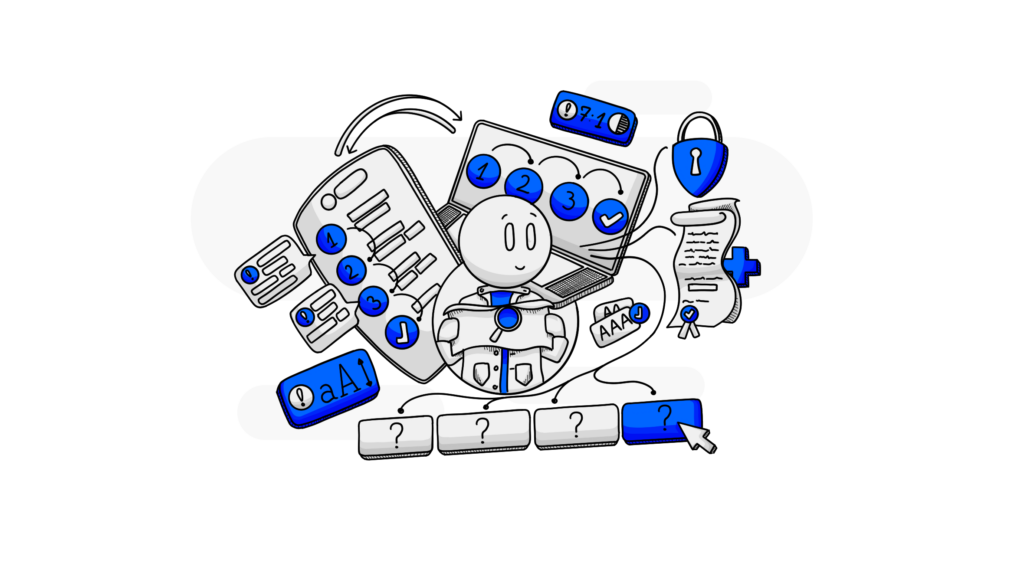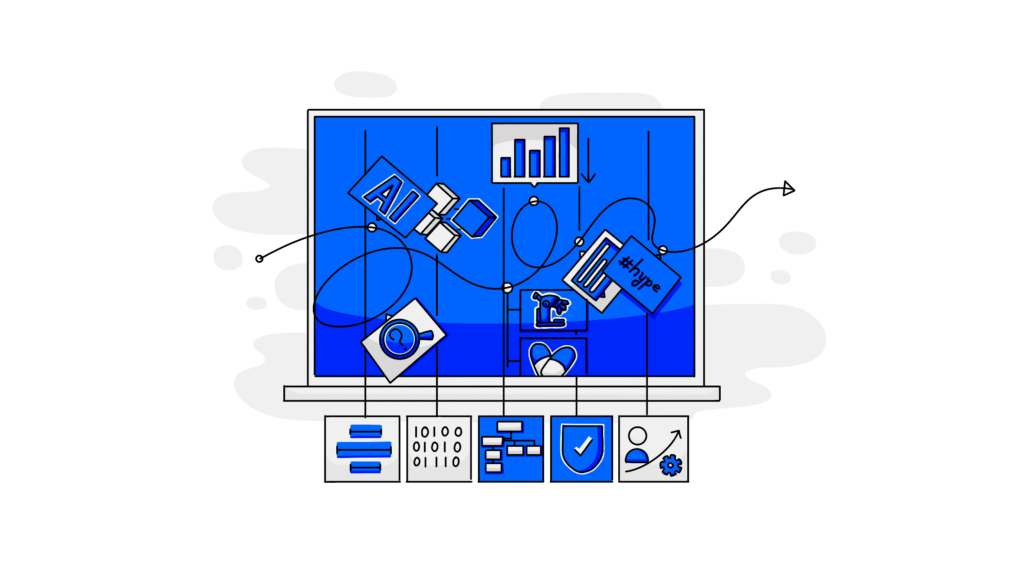Martech stands for marketing technologies, namely technical tools and software that marketers use to achieve business goals. The Martech Landscape comprises all those vendors who build and provide dedicated software for marketing actions.
Apart from the general meaning of the term, there is an actual visual Martech Landscape that takes the shape of a marketing technology landscape supergraphic, with the company logos of the Martech vendors grouped into solution categories.
1. What is the Martech Landscape?
In 2011, the Martech Landscape supergraphic started. 11 years later, Scott Brinker, HubSpot’s VP platform ecosystem, and Frans Riemersma from Martech Tribe released the 2022 Marketing Technology Landscape edition.
Moreover, to underline the importance of the Martech Landscape, the International Martech Day is inaugurated- #MartechDay. It is celebrated in May, on the first Tuesday.
The marketing technology landscape saw a significant expansion over the past few years (we’ll see just how much a bit later). This means that marketers now have plenty of options to choose from. It also means it gets more difficult to find that exact marketing tech app or platform that does the job and gets value for the money.
The good news is that there are no „best tools” or one solution to fit them all. It is more likely to find bits and pieces that address a specific marketing operation.
2. What is MarTech?
With a myriad of software solutions available for businesses, it may become a little confusing to know which ones fall under the general notion of Martech. In short, it is about the martech stack that supports marketers in creating marketing strategies and putting them into practice through plans and marketing campaigns.
These tools provide consolidated consumer data that draw a much clearer picture of market insights and consumer behavior, but also tools to reach customers and respond to their needs, preferences, and interactions. It is about datadriven marketing.
With the help of martech tools, you can collect customer data about their digital experience with various products from various sources such as social media, e-commerce platforms, or search engines.
You can use Martech solutions to:
- Collect and analyze customer data
- Reach target audiences
- Automate repetitive processes.
Martech solutions can spread from software to better control marketing attribution, email marketing, customer experience software, content management, or CRMs.
3. Top Martech trends you should follow
Classical marketing principles and the latest technology combine into the martech industry that we see today. This drives sales enablement and tightens the relationship with your customers. Here are 5 MarTech trends to follow in 2024:
Data analysis
Information is power. The more you know about your customers and potential clients, the better your offers can become and closer to what people are looking for. Later this year, in the second half of 2002, third-party cookies become history.
So consider investing in proven tools for data management or in a customer data platform. If you can’t find something to suit your business the way you need it, we may be able to help you with custom software development.
UX
User Experience matters. A lot. People are increasingly interested in personalized experiences. This is why you’ll gain loyal, enthusiastic customers if you manage to provide a full, relevant, and customized interaction with your clients.
Here you can introduce technology trends into experiential marketing. You can use Virtual Reality and make your website or online shop as friendly as possible. You can turn to us for web application services, to benefit from the experience a custom-made web app can offer to clients.
AI + AR + VR = Metaverse
The ultimate use of technology for enhanced user experience is in the metaverse. Interactive ads are already in place, especially on gaming platforms – an excellent marketplace for many products and services.
The gamevertising trend is also seen in the movie industry. Using your metaverse avatar to try on clothes tends to become the new normality.
Keywords, SEO, and authentic content
Content marketers can be reassured (or not?) that keywords and SEO keep their relevance, with loading speed and interactivity added among the extra metrics. However, rich, authentic content will matter more after seeing the rule of short, catchy videos on TikTok or Insta reels.
E-commerce going next level
Modern marketers need to consider new entries in the e-commerce landscape. For instance, consider Web3 and DeFi (decentralized finance), trends involving non-fungible tokens (NFTs), blockchain, and cryptocurrency. The easier, faster, and more transparent the transactions, the more sales, and customers.
4. The evolution of the MarTech landscape over the years
“I think marketing, more than almost any profession I can think of, has really gone through just cataclysmic changes over the past 20 years”, said Scott Brinker in an interview for storychief.io.
If we are to take for certain the numbers in the 2022 Marketing Technology Landscape (and there is no reason not to do so), there are currently 9932 martech apps available for marketing professionals around the Globe and 49 categories under which they fall, meaning 49 types of marketing actions they support.
In 2011, when the first visual model of the Martech Landscape was released, there were around 150 martech solutions. It reached the first thousand vendors in 2014. Browsing forward through the Martech Landscapes over the past 8 years, it grew by almost 1000 from one year to another.
Until the 2000s, marketing was operated in a classical manner. It depended on the marketer’s personal experience with the customers to create marketing campaigns and tactics that addressed the right needs, behaviors, and preferences. Marketing and technology were two separate fields that seemed to have very little in common (at least, using marketing to sell technology, but not the other way around).
With the increase in business-oriented software development, which was designed to support and improve business processes, marketing also caught the wave. It started to benefit from marketing automation and customer data platform.
From basic email campaign apps to sales enablement and sophisticated content management software, the Martech Landscape has gone a long way. There are almost 10 000 martech solutions on a broad platform ecosystem.
Sales and marketing departments can now be equipped with a customized tech stack that supports marketing professionals in expanding their capabilities. This also drives specialization and niche expertise, opening new dimensions of marketing performance.
5. Best Martech Solutions in 2024
As Scott Brinker said in an interview for storychief.io, “It’s much more about finding a tool that does what you need, and you like it, and you like the company. And as you work with it, you’re able to be really effective. […] That being said, one piece of advice I give people, and I’m obviously biased on this, but I still think it’s true. The MarTech industry becomes more driven by ecosystems around these platforms. In many ways, I think that can help marketers whatever they choose as the foundation of their MarTech stack.”
With that in mind, here are some of the recommended digital marketing tools in the MarTech landscape that suit the 2024 trends:
Marketing automation by HubSpot
If you are looking for ”all in one” marketing platforms, HubSpot has it all. They have built a platform ecosystem that can serve many of your marketing objectives. They have email marketing, social media, SEO, blogging, advertising, and many more.
Lead generation and customer engagement with Intercom
For that interactive customer experience, you can deliver customized messages to your web visitors while tracking relevant data for consumer behavior by using a set of Intercom tools.
Webinars, online conferences, and community meetings on Zoom
Zoom is probably one of the best-known online platforms. Many people associate it with tedious meetings while working from home. However, it has the advantage of being familiar and installed on most people’s laptops (or mobiles).
This allows you to get in touch with your brand community, deliver quality, interactive content, and get to know your customers with relevant webinars, Q&A sessions, and other online meetings.
Know your data with Google Analytics
Google Analytics is still very much on-trend even in 2024, with search engine optimizations staying as relevant as ever. Online consumer data is powerful, and Google has the experience and technology to offer the best output.
Automate the customer experience with ActiveCampaign
ActiveCampaign is a valuable tool for turning leads into customers, as it automates the lead reach, follow-up, and conversion steps.
Organized the content marketing with Uberflip
Uberflip is an online marketing tool designed to group online content so it’s easier for customers to find relevant subjects and for content creators to manage.
YouTube alternative with Wistia
Wistia is a video and podcast hosting platform better suited for B2B marketing that opts for video marketing. They allow video customization and, of course, collect relevant data about visitors to support your marketing strategy and decisions.
Social media management with Sprout Social
Switching between accounts and social media platforms is time-consuming, not to mention frustrating. Sprout Social positions itself as an ”all-in-one social media management.” This can save a lot of time and effort and help to keep the focus on relevance and content quality.
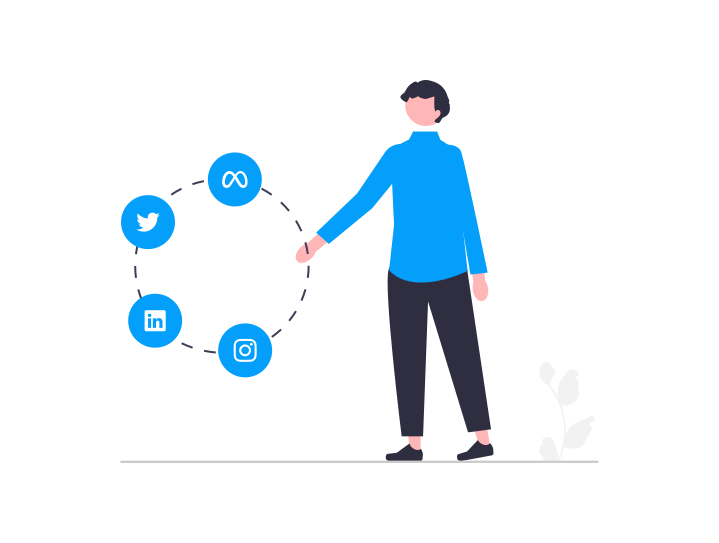
6. Martech Landscape Key Stats
The global market for martech solutions was estimated to reach $344.8bn in 2021. Since the first edition of the Martech Landscape supergraphic, the market has grown by more than 5% yearly. It was in the past 3 years when it experienced an even more spectacular growth – 13,6% from 2019 to 2020 and 24% from 2020 to 2022.
There are also some interesting movements within the categories of marketing solutions. In the 2020 marketing technology landscape, the most growth is in Data (25,5%), Management (15,2%), and Social and Relationships (13,7%). In 2022, Management was the star with a fantastic growth of 67%, followed by Content and Experience with 34% (which, in 2020, grew only by 5,6% compared to 2019) and Sales with 24%.
Indeed, there is a two-year span as opposed to the one-year comparisons in the previous reports. However, the growth is still spectacular and relevant for the trend businesses took following the pandemic.
7. Top 3 Trends for Martech Landscape in 2024
Now, with some examples of martech solutions and trends, we can conclude that the martech landscape in 2024 is dominated by three major directions:
E-commerce. With its enhanced transaction possibilities, interactivity, and sales channels that include social media, e-commerce appears to be the most effective sales channel, especially for B2B commerce, as was concluded in a McKinsey survey at the end of 2021.
No more coding. There are an increasing number of marketing tech solutions that allow content marketers (and businesses, in general) to build content vehicles without requiring any programming skills: landing pages and websites, blogging platforms, explicative or marketing videos and animations or video marketing, data analyses, and so on. Most operations that used to require long code lines are now automated by content creation apps.
BigOps. The concept of BigOps refers to managing all the operations involved in the digital existence and activity of a company. It doesn’t comprise only the web presence, online sales, ads, or social media. It includes everything from financial flows, production, customer relationship, design, security, legal, etc. Tools support and render more efficient the digital management of all these digital business components.
8. Are Artificial Intelligence & Machine Learning the future of marketing technology?
In short, artificial intelligence & machine learning are definitely in the cards for digital marketing. These technologies evolve themselves, becoming more helpful in supporting marketing efforts. How?
Think of customized consumer experience, staying close to the client on its journey with the brand, delivering real-time responses, voice chat and search, improved search engine optimization, personalized video marketing, and so on.
So yes, we’ll be seeing more tools relying on artificial intelligence and machine learning to deliver more relevant data and more personalized outcomes in your brand’s interaction with customers. So, marketing leaders should keep a close eye on these rapidly evolving technologies.
9. 4 takeaways to navigate in the MarTech landscape
- Thanks to technology, AI, and machine learning, marketing has become more personal and better adapted to customers.
- There are thousands of martech solutions to choose from; platforms and ecosystems are efficient, but it all depends on your marketing strategy and business needs. You could also outsource custom software development for a more personalized approach to your digital marketing operations. Before you decide whether to get an already-built digital tool or have one built for yourself, check the steps of the new product development process.
- Focus on performance marketing. Analyze the data, understand your consumers and offer them a digital experience as complete and customized as technology allows.
- Explore the new edges of e-commerce with the Web3 and DeFi already at your door.
In conclusion, as the landscape graphic shows, the martech industry keeps growing, and it is all for the better, even though that means a lot of research for a marketing team. All in all, it is the customers who win from improved experiences with brands, and brands gain more satisfied and loyal clients.



